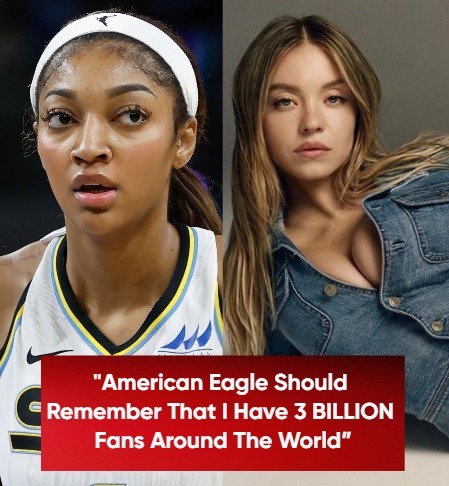WNBA star Angel Reese has once again placed herself at the center of a cultural firestorm after calling for a nationwide boycott of American Eagle, condemning the brand’s latest ad campaign featuring actress Sydney Sweeney as “disgusting and divisive.” The comments, which Reese posted late last night on her verified X account, formerly known as Twitter, quickly went viral and ignited a wave of reactions from fans, media analysts, fashion insiders, and cultural commentators.

Reese, who has never been shy about leveraging her platform to speak out on issues beyond basketball, made it clear that she believes the imagery and tone of the new campaign cross an unacceptable line. “This is NOT the America I stand for,” Reese declared in her post. “American Eagle’s decision to push this campaign is disgusting and divisive. We deserve brands that unite, not pit people against each other. I won’t wear their clothes again, and neither should you.” Her remarks did not specify exactly which elements of the campaign she found offensive, but sources close to the player have suggested she was particularly disturbed by the underlying themes and aesthetic of the shoot, which critics have described as tone-deaf given the current social climate.
The campaign itself, launched by American Eagle just weeks ago, was designed as a major national rollout featuring Sydney Sweeney, the breakout star of Euphoria, in a series of retro Americana-inspired looks that blended nostalgic styling with playful and provocative undertones. Promoted aggressively on social media, television spots, and billboards across the country, the campaign was clearly meant to tap into the cultural zeitgeist and strengthen the brand’s connection with younger consumers. Instead, Reese’s fiery response has shifted the narrative, transforming what was supposed to be a feel-good, aspirational campaign into the subject of national debate.
Within hours of Reese’s post, hashtags such as #BoycottAmericanEagle and #StandWithAngel shot into trending positions on X, drawing in thousands of comments and sparking heated exchanges. Many of Reese’s supporters applauded her courage, praising her for using her platform to challenge what they viewed as problematic messaging from a powerful fashion brand. These backers pointed to her history of speaking up about issues of representation, equity, and cultural responsibility, noting that she has consistently extended her influence beyond the basketball court. Yet not everyone agreed with Reese’s stance.
Critics accused her of overreacting and targeting Sweeney personally rather than critiquing the brand or its leadership. “Sydney Sweeney didn’t design the campaign — she’s just the face of it,” one commenter wrote. “Going after her isn’t the answer.” Others suggested that Reese’s remarks risked creating unnecessary divisions at a time when public discourse is already polarized. As of Thursday morning, American Eagle and Sydney Sweeney have remained silent on the controversy, continuing to promote the campaign on official social media channels without acknowledging the backlash. The company’s lack of immediate response has only fueled speculation about whether it will address the criticism head-on or attempt to weather the storm.
Industry experts caution that Reese’s call for a boycott could have significant consequences. In today’s fast-moving and interconnected media environment, even a single viral post from a celebrity can spark ripple effects that damage a brand’s image, influence consumer behavior, and attract unwanted scrutiny. Media analyst Jordan Castillo noted, “This is a high-visibility, high-risk move. If public sentiment turns against Reese, she could alienate sponsors and complicate her own brand partnerships. But if she connects with a broader public mood of discontent, she could pressure American Eagle into responding or even adjusting its campaign.”
Reese’s decision to confront American Eagle underscores her willingness to embrace athlete activism, a path that comes with both power and risk. Known for her outspoken personality as much as her dominance on the basketball court, Reese has consistently used her visibility to advocate for issues she cares about, from pay equity in the WNBA to broader social and cultural debates. This latest move demonstrates her readiness to take on major corporations in the name of what she sees as cultural integrity and unity. The fallout from her remarks is still unfolding, and the ultimate impact remains to be seen.
If her boycott campaign gains traction, it could force American Eagle to alter its marketing strategy or issue a public apology. On the other hand, if the backlash against her grows louder, it could strain her relationships with sponsors and affect her public standing. Regardless of the outcome, Angel Reese’s stance has once again highlighted the evolving role of athletes as cultural influencers, capable of shaping conversations far beyond the world of sports. For American Eagle, the controversy is a reminder of how quickly a high-profile campaign can spiral into reputational risk, while for Reese, it is the latest example of her determination to speak her mind, even when it means inviting criticism.





